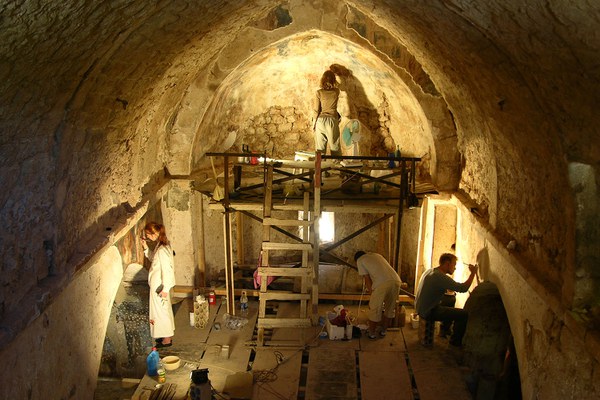Dumbarton Oaks makes a limited number of grants to assist with scholarly projects in Byzantine Studies, Pre-Columbian Studies, and Garden and Landscape Studies. Support is generally for archeological investigation, as well as for the recovery, recording, and analysis of materials that would otherwise be lost. The normal range of awards is $3,000–$10,000. Eligible projects may include, but are not limited to, the following:
- non-destructive investigation, excavation, and/or on-site study of a (Byzantine, Pre-Columbian, Garden) site or component of one
- surveying or photographing monuments and objects that are at risk (e.g., architecture, gardens, paintings, mosaics, and sculptures in situ), as well as objects that have already been collected but are largely unrecorded and endangered.
Pre-Columbian project awards are intended only to survey, excavate, and/or document sites, landscapes, or objects that are in imminent danger. Applicants should provide evidence that such sites, landscapes, or objects are under immediate threat.
Garden and Landscape grants are intended to support primary research of a specific site. Project grants may be used for a broad array of projects including field research, site analysis, botanical surveys, heritage conservation and restoration planning, with the goal of promoting the preservation and understanding of historic gardens and other significant designed landscapes.
For Byzantine project awards, priority is given to small projects, as well as start-up support for new projects, or for the final push for completion.
Funding may only be used to cover direct costs for which original documentation must be submitted for reimbursement. Examples of eligible expenses include transportation (excluding students), meals, housing, vehicle rental, workpeople’s wages, and technical analysis (as part of the overall project). Grants are not made for the purchase of computers or other equipment, or to cover the salaries of the principal investigators. Project grants are not given purely for the purpose of travel, or for work associated with a degree, library or archival research, catalogues, nor for conservation and restoration per se. Priority is given to applicants who have not previously received support from Dumbarton Oaks.
Funds can only be disbursed to individuals, not academic or other institutions, and only on a reimbursement basis (upon submission of receipts). Submission of a final report is obligatory. Funds are available July 1 – June 1 of the award year. Funding is non-recurring.
Qualifications and Conditions
Project grants are limited to applicants holding a doctorate or the equivalent, and are awarded on the basis of:
- ability and preparation of the principal project personnel (including knowledge of the requisite languages) and
- interest and value of the project to the specific field of study.
Individuals currently affiliated with Dumbarton Oaks—such as staff or the committees of Senior Fellows—are not eligible. Applications are reviewed by an external committee of scholars in the relevant field. Awards are made for projects conducted within the span of one fiscal year (July 1 through June 30).
Completed applications must include two letters of reference posted directly by the recommenders to the online application system.
To Apply
Please read and follow the online instructions. Applications, in English, must be submitted electronically via the Embark application system by November 1.
2022–2023 Project Grants
The Church Excavation Project in the Asklepieion Area of Ancient Messene
Georgios Deligiannakis, Open University of Cyprus
Geophysical Exploration at the Byzantine City of Ashdod-Yam
Alexander Fantalkin, Tel Aviv University
RC14 Dating of Byzantine Fortifications on the Acropolis at Sardis
Jordan Pickett, University of Georgia-Athens
The Lower Lacantun River and the Lakamtuun Dynasty: Investigating an At-Risk Archaeological Landscape
Whittaker Schroder, University of Florida
African American Textiles as an Expression of Place
Jennifer Steverson, Independent Scholar
Byzantine Dome Construction in South Italy as Transcultural Knowledge
Joseph Williams, University of Maryland-College Park

